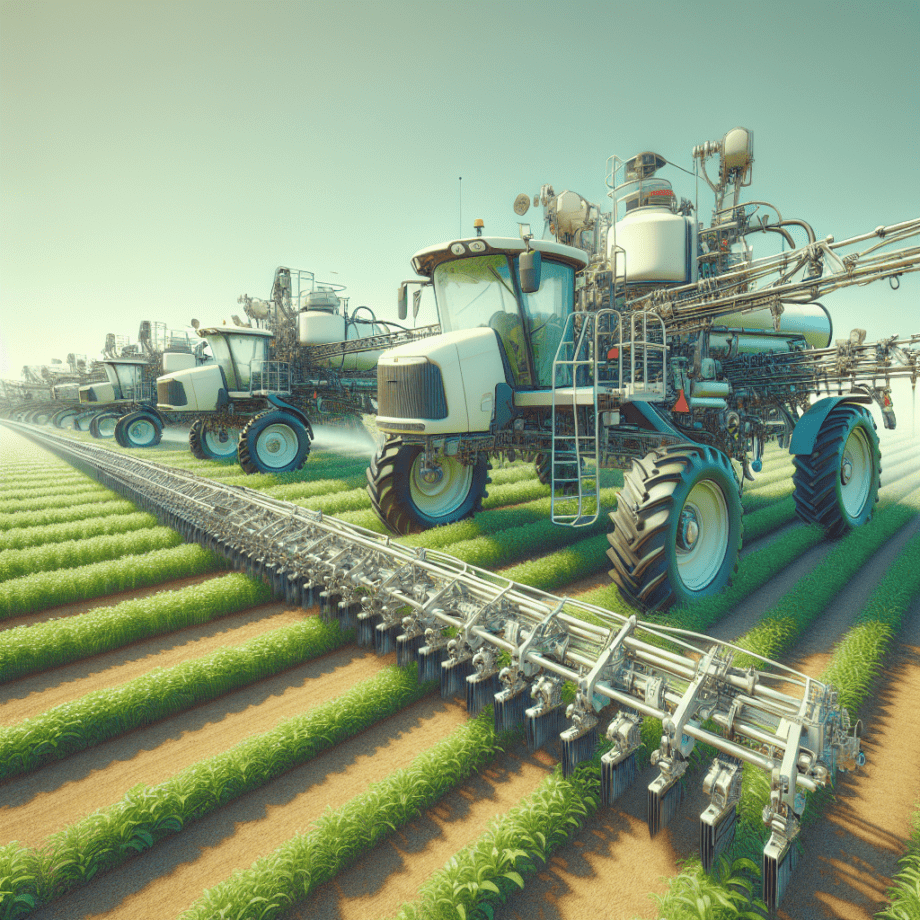Sprayers are essential tools in modern agriculture, playing a crucial role in the application of pesticides, herbicides, and fertilizers to protect crops and enhance yields. This article delves into the various types of sprayers available and their specific applications in crop protection.
Types of Sprayers
Sprayers come in a variety of designs and sizes, each tailored to specific agricultural needs. Understanding the different types of sprayers is essential for selecting the right equipment for your farming operations.
Handheld Sprayers
Handheld sprayers are the simplest and most affordable type of sprayers. They are typically used for small-scale applications, such as in gardens or small farms. These sprayers are manually operated and are ideal for spot treatments and precise applications. They are lightweight, easy to use, and require minimal maintenance.
- Advantages: Cost-effective, easy to use, and portable.
- Disadvantages: Limited capacity and coverage area, labor-intensive.
Backpack Sprayers
Backpack sprayers are a step up from handheld sprayers, offering greater capacity and coverage. These sprayers are worn on the back, allowing the operator to move freely while spraying. They are commonly used in medium-sized farms and for spot treatments in larger fields. Backpack sprayers can be either manually operated or battery-powered, providing flexibility in their use.
- Advantages: Increased capacity, better coverage, and mobility.
- Disadvantages: Can be heavy and tiring to use for extended periods.
Tractor-Mounted Sprayers
Tractor-mounted sprayers are designed for large-scale agricultural operations. These sprayers are attached to tractors, allowing for efficient and uniform application of chemicals over large areas. They come in various configurations, including boom sprayers and air-blast sprayers, each suited for different types of crops and terrains.
- Advantages: High capacity, efficient coverage, and reduced labor.
- Disadvantages: Expensive, requires a tractor, and may not be suitable for small or uneven fields.
Self-Propelled Sprayers
Self-propelled sprayers are advanced machines designed for large-scale and commercial farming operations. These sprayers are equipped with their own engines and can move independently, providing unparalleled efficiency and precision. They are often used for row crops and large fields, where uniform application and high productivity are essential.
- Advantages: High efficiency, precision application, and large coverage area.
- Disadvantages: Very expensive, requires skilled operators, and high maintenance costs.
Applications of Sprayers in Crop Protection
Sprayers are indispensable in crop protection, ensuring that crops receive the necessary treatments to thrive. The applications of sprayers in agriculture are diverse, ranging from pest control to nutrient management.
Pesticide Application
Pesticides are crucial for protecting crops from pests and diseases. Sprayers allow for the precise application of pesticides, ensuring that crops are adequately protected while minimizing the impact on the environment. Different types of sprayers can be used depending on the scale of the operation and the specific requirements of the crops.
- Handheld and Backpack Sprayers: Ideal for spot treatments and small-scale applications.
- Tractor-Mounted and Self-Propelled Sprayers: Suitable for large-scale and uniform pesticide application.
Herbicide Application
Weeds can significantly impact crop yields by competing for nutrients, water, and sunlight. Herbicides are used to control weed growth, and sprayers are essential for their application. The choice of sprayer depends on the type of crops, the extent of weed infestation, and the size of the field.
- Handheld and Backpack Sprayers: Effective for targeted weed control in small areas.
- Tractor-Mounted and Self-Propelled Sprayers: Efficient for large-scale herbicide application.
Fertilizer Application
Fertilizers are vital for providing crops with the necessary nutrients to grow and produce high yields. Sprayers can be used to apply liquid fertilizers, ensuring even distribution and efficient nutrient uptake by the plants. The type of sprayer used will depend on the scale of the operation and the specific nutrient requirements of the crops.
- Handheld and Backpack Sprayers: Suitable for small-scale and precise fertilizer application.
- Tractor-Mounted and Self-Propelled Sprayers: Ideal for large-scale and uniform fertilizer application.
Conclusion
Sprayers are indispensable tools in modern agriculture, offering a range of options to suit different farming needs. From handheld and backpack sprayers for small-scale applications to tractor-mounted and self-propelled sprayers for large-scale operations, there is a sprayer for every requirement. Understanding the types and applications of sprayers is essential for effective crop protection and maximizing agricultural productivity.
